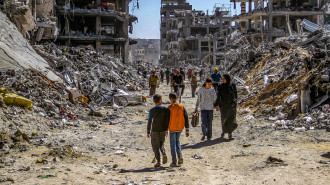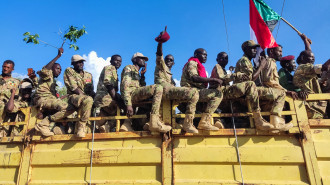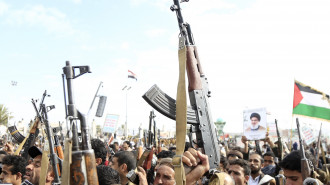Human rights defenders a continued target of Iran's regime
Amnesty International told The New Arab on Wednesday, that reports that she had been convicted of charges ranging from "inciting corruption and prositution" and "appearing in public without a hijab" were not true, but she faces a grim situation trapped in legal limbo.
Her conviction could result in up to 34 years in prison and 148 lashes, and follows a sustained campaign of by Iranian legal authorities against human rights defenders.
Iran's intelligence services have intensified their crackdown on human rights defenders since June 2018, Human Rights Watch reported, with other activists and union leaders also detained.
"Now Iran is not only arresting dissidents, human rights defenders, and labor leaders, but their lawyers as well, criminalising their fundamental freedoms," said Michael Page, deputy Middle East director at HRW, after the conviction of three lawyers in December.
These include Mohammad Najafi, who was arrested in October 2018. He was reportedly sentenced to a total of 13 years: 10 years for "conveying information to a hostile country" through interviews with foreign media, two years for insulting the supreme leader and one year for publicity in support of opposition groups.
He vocally advocated for his client, Vahid Heydari, who died in suspicious circumstances in an Iranian detention center in 2017. He told media outlets that authorities were attempting to cover up the death by claiming Heydari committed suicide.
Najafi has been repeatedly charged and acquitted. "The authorities themselves have told me that they are trying to grind me into oblivion," Najafi said in May 2018.
Hoda Amid was detained in September 2018 and taken to an unknown location.
Amid is a human rights lawyer and women's rights activist fighting for increased representation of women in parliament and free and fair elections.
She was arrested alongside activist Najmeh Vahedi, three days before they were scheduled to host a workshop on Iran's marriage and divorce laws.
![Prominent human rights lawyer Nasrin Sotoudeh photographed in 2014 in Tehran [Getty]](https://www.newarab.com/sites/default/files/styles/medium_16_9/public/media/images/2C48B6D8-84A3-4E98-8909-20F99F81ED0B.jpg?h=d1cb525d&itok=sPYIiAaS) |
|
|
Human rights lawyer Nasrin Sotoudeh photographed in 2014 [Getty] |
Nasrin Sotoudeh was arrested in June 2018. She had worked on the cases of several women arrested for appearing in public without headscarves in protest at the country's mandatory dress code.
She was taken to Evin Prison in Tehran, where was informed she had been convicted in absentia in 2016 to five-years in prison. She was not present at the trial because court authorities refused her entry on the basis that she was not wearing appropriate Islamic dress.
During Sotoudeh's first imprisonment, from 2010 until 2013, she went on hunger strike a total four times, in part to protest at the conditions in Evin and over a ban on seeing her son and daughter.
One of her clients received a 20-year sentence for removing her headscarf. She was arrested alongside 29 others for removing the scarf as part of a campaign known as "White Wednesdays".
Ghasem Sholeh-Saadi and Arash Keykhosravi were sentenced to six years in prison for taking part in an "illegal gathering" where they protested outside Iran's Parliament building and for "propaganda" against the ruling system.
 |
|
|
Sholeh-Saadi with reporters as he registered his candidacy in 2013 [Getty] |
Sholeh-Saadi, 64, a longtime critic of the political establishment, was barred from running for president in 2017.
The suspicious death of an Iranian-Canadian environmentalist in 2018 is one of many sensitive cases Keykhosravi has been involved in.
Abdolfattah Soltani, has been imprisoned for seven years, serving a 13-year sentence for "being awarded the Numerberg International Human Rights Award", "interviewing with media about his client's cases", and "co-founding the Defenders of Human Rights Centre".
As one of Iran's most prominent human rights lawyers, he worked on several cases where civilians were being detained on politically motivated charges.
|
Two former staff members at the Human Rights Centre, Narges Mohammadi and Nasrin Sotoudeh are imprisoned, and the centre's co-founder, Nobel Peace Laureate Shirin Ebade, had to flee Iran in 2009.
Two other jailed attorneys - Payam Derafshan and Farrokh Forouzan - were released on bail shortly after their arrest in September 2018. They were arrested by agents of Iran's intelligence ministry when they were visiting Keykhosravi's family.
Forouzan and Derafshan were two of the three female lawyers (along with Hoda Amid) and one activist arrested in the space of one week in early September 2018 in a hasty crackdown.
This caused a "suffocating climate of fear" for others working to advance the rights of women in the country, according to Amnesty International.
On the same day as Amid's arrest, women's rights activist Najmeh Vahedi was arrested at her Tehran home by the Revolutionary Guards' intelligence unit, who like Amid has campaigned for the empowerment of women, particularly those in marriage.
Article 48
Many of the lawyers have vocally opposed an amendment to Article 48, a criminal code that only allows a small number of state approved lawyers - just 20 in Tehran - to defend individuals charged with national security crimes.
"The authorities in Iran arrested these lawyers for the same reason all the other human right defenders are imprisoned- to prevent the effective defense of political prisoners and civil liberties in Iran," said Hadi Ghaemi, the executive director for the Center for Human Rights in Iran (CHRI).
Sotoudeh told CHRI that this disqualifies 20,000 licensed lawyers and seriously undermined a prisoner's right to a fair trial.
Follow us on Twitter: @The_NewArab





 Follow the Middle East's top stories in English at The New Arab on Google News
Follow the Middle East's top stories in English at The New Arab on Google News


